This article was medically reviewed by Luba Lee, FNP-BC, MS and by wikiHow staff writer, Danielle Blinka, MA, MPA. Luba Lee, FNP-BC is a Board-Certified Family Nurse Practitioner (FNP) and educator in Tennessee with over a decade of clinical experience. Luba has certifications in Pediatric Advanced Life Support (PALS), Emergency Medicine, Advanced Cardiac Life Support (ACLS), Team Building, and Critical Care Nursing. She received her Master of Science in Nursing (MSN) from the University of Tennessee in 2006.
There are 10 references cited in this article, which can be found at the bottom of the page.
This article has been viewed 317,589 times.
Finding out you’re pregnant is an exciting time. Now that you know your bundle of joy is on the way, you’ll want to figure out your due date. While due dates are just an estimation, they can help you be prepared in time for your baby’s arrival. Additionally, knowing your projected due date can help you monitor your baby’s growth and development. There are several methods for determining your due date, and your doctor can help you come up with the most precise estimation.
Steps
Using an Online Calculator
-
1Choose your due date calculator. There are several free online options for calculating your due date. Each site’s calculator has different features that may or may not appeal to you, such as different ways to calculate your due date and optional reports. You may prefer to use one provided by your favorite maternity website. If you aren’t sure about which one to try, the following due date calculators are popular with expectant mothers:
- For additional pregnancy tracking tips, try What to Expect: https://www.whattoexpect.com/due-date-calculator/
- For pregnancy tracking and pregnancy facts, try Baby Center: https://www.babycenter.com/pregnancy-due-date-calculator
- For more calculation options and a detailed report, try Your Due Date: http://www.yourduedate.com/
-
2Enter the date of your last period or your conception date. Most calculators can provide you an estimated due date based on either the date of your last period or the date you conceived your baby.[1] Most women can remember the date of their last period, but determining the exact date of conception is usually impossible.
- Use the date your most recent period began.
- Mothers who have had IVF treatments or who are using an ovulation tracking method may know their actual conception date.[2]
Advertisement -
3Confirm the date with your doctor. The calculator can provide a good estimation of when your bundle of joy will arrive, but you need to visit the doctor to make sure that it’s correct. Even if your doctor agrees with your projected due date, remember that only 5% of babies are born on their official due date.[3]
- An online calculator can be a great way to estimate your due date early in your pregnancy so that you know what to expect.
- Later, your doctor can give you a clearer picture about when your baby should arrive.
Counting the Weeks Manually
-
1Determine the date of the first day of your last period. Your last period will be the most recent period you had before finding out you’re pregnant. The first day of that period represents the first day of your cycle.
- The date of your last period is typically used instead of your conception date because most women do not know their conception date.
- Conception can occur 11-21 days after the first day of your last period, and sperm can survive in the body for a few days after intercourse to fertilize an egg.[4]
-
2Count forty weeks from the date of your last period. Your baby will be due 280 days after the first day of your last period, which works out to forty weeks. This also represents ten lunar months, or 28-day cycles.[5]
- Typical pregnancies last about 37-38 weeks but are estimated at 40 since conception usually occurs about two weeks after the date of your last period, which is the date used to estimate the due date.[6]
-
3Use Naegele’s rule as an alternative. You can also calculate your due date by counting back three months from the first day of your last period, adding seven days, and then adding a year. This will provide you with an estimated due date.[7]
- Naegele's rule provides an alternative for calculating your due date that's easier for some people to do in their head.
- For example, if your last period began on August 8, then you could count back three months to May 8. If you add seven days, you'd get May 15. Your due date would then be next May 15.
-
4Talk to your doctor if you have an irregular period. Using the date of your last period works best for 28-day cycles. If you have an irregular cycle, you may need to wait until your medical provider can perform an ultrasound to get an estimated due date.[8]
Using an Ultrasound
-
1Make an appointment with your doctor. As your baby grows, your doctor can do an ultrasound to measure your baby’s size. This will provide the doctor with a better view of the baby’s development, which will allow the doctor to estimate a due date. This due date will be more accurate in early pregnancy than those based on your period because it’s connected to the baby’s development in the womb.
- Ultrasounds can be done as early as five to six weeks after the mother’s last period.[9]
-
2Ask for an ultrasound during weeks eight to eighteen. This is the best time to estimate your due date using an ultrasound. Before eight weeks, the baby's growth is hard to measure. After eighteen weeks, it's normal for babies to develop differently on the baby's own unique timeline.[10]
-
3Wear loose, two piece clothing that is easy to remove. Your doctor will need to be able to apply the ultrasound wand to your stomach in order to view the baby. You may have to remove your clothing, though your doctor could allow you to just adjust your clothing if you wear an outfit with two pieces.[11]
- For example, you could lift up your shirt to expose just your stomach.
-
4Expect to remove all clothing for a transvaginal ultrasound. You will need to remove any clothing and jewelry that may interfere with the transvaginal ultrasound, and the doctor will provide you with a gown. A wand will be lubricated and inserted into your vaginal canal to get a closer look at your uterus and baby.[12]
- Your doctor may order a transvaginal ultrasound to get a more complete view of the uterus if it's early in the pregnancy.[13] They may also order one if you have a high risk pregnancy or if there may be problems with your baby.
- Your doctor will have you empty your bladder just before the transvaginal ultrasound is performed.[14]
-
5Drink enough water to fill your bladder. Ultrasounds usually work best if you’ve have a full bladder, so drink plenty of water before your visit to the doctor. Up to six glasses of water may be recommended.
- Ask your doctor if it’s okay to eat before your ultrasound, as sometimes it’s best to stop eating a few hours before the exam.[15]
-
6Tell the doctor the date of your last period. Your doctor can best estimate your due date if they are able to use both the date of your last period and your ultrasound. Using these two pieces of information, your doctor can pinpoint your baby’s arrival with the best accuracy.[16]
Expert Q&A
-
QuestionHow long after intercourse do sperm stay alive?
 Luba Lee, FNP-BC, MSLuba Lee, FNP-BC is a Board-Certified Family Nurse Practitioner (FNP) and educator in Tennessee with over a decade of clinical experience. Luba has certifications in Pediatric Advanced Life Support (PALS), Emergency Medicine, Advanced Cardiac Life Support (ACLS), Team Building, and Critical Care Nursing. She received her Master of Science in Nursing (MSN) from the University of Tennessee in 2006.
Luba Lee, FNP-BC, MSLuba Lee, FNP-BC is a Board-Certified Family Nurse Practitioner (FNP) and educator in Tennessee with over a decade of clinical experience. Luba has certifications in Pediatric Advanced Life Support (PALS), Emergency Medicine, Advanced Cardiac Life Support (ACLS), Team Building, and Critical Care Nursing. She received her Master of Science in Nursing (MSN) from the University of Tennessee in 2006.
Board-Certified Family Nurse Practitioner The lifespan of a sperm after ejaculation depends on circumstances. It can live for a maximum of 5 days in the female reproductive tract. Fertilization is possible as long as the sperm remain active.
The lifespan of a sperm after ejaculation depends on circumstances. It can live for a maximum of 5 days in the female reproductive tract. Fertilization is possible as long as the sperm remain active. -
QuestionCan I consider my 32 week ultrasound result as my actual due date?
 Luba Lee, FNP-BC, MSLuba Lee, FNP-BC is a Board-Certified Family Nurse Practitioner (FNP) and educator in Tennessee with over a decade of clinical experience. Luba has certifications in Pediatric Advanced Life Support (PALS), Emergency Medicine, Advanced Cardiac Life Support (ACLS), Team Building, and Critical Care Nursing. She received her Master of Science in Nursing (MSN) from the University of Tennessee in 2006.
Luba Lee, FNP-BC, MSLuba Lee, FNP-BC is a Board-Certified Family Nurse Practitioner (FNP) and educator in Tennessee with over a decade of clinical experience. Luba has certifications in Pediatric Advanced Life Support (PALS), Emergency Medicine, Advanced Cardiac Life Support (ACLS), Team Building, and Critical Care Nursing. She received her Master of Science in Nursing (MSN) from the University of Tennessee in 2006.
Board-Certified Family Nurse Practitioner Usually, your first ultrasound that is done in the first 20 weeks of pregnancy is your most accurate one (plus or minus 1 or 2 weeks) at predicting your baby’s birth. After 28 weeks, the ultrasound may be off by three or more weeks at predicting a due date. Your doctor usually will use the date of your last menstrual period as a way to calculate your due date.
Usually, your first ultrasound that is done in the first 20 weeks of pregnancy is your most accurate one (plus or minus 1 or 2 weeks) at predicting your baby’s birth. After 28 weeks, the ultrasound may be off by three or more weeks at predicting a due date. Your doctor usually will use the date of your last menstrual period as a way to calculate your due date.
References
- ↑ https://www.whattoexpect.com/due-date-calculator/
- ↑ http://americanpregnancy.org/while-pregnant/calculating-conception-due-date/
- ↑ http://www.yourduedate.com/
- ↑ https://unplannedparenthood.org/how-to-calculate-conception-date-from-ultrasound/
- ↑ http://www.hopkinsmedicine.org/healthlibrary/conditions/pregnancy_and_childbirth/calculating_a_due_date_85,P01209
- ↑ https://www.babycenter.com/404_how-is-a-pregnancy-due-date-calculated_10338321.bc
- ↑ http://www.hopkinsmedicine.org/healthlibrary/conditions/pregnancy_and_childbirth/calculating_a_due_date_85,P01209
- ↑ http://www.hopkinsmedicine.org/healthlibrary/conditions/pregnancy_and_childbirth/calculating_a_due_date_85,P01209
- ↑ http://americanpregnancy.org/while-pregnant/calculating-conception-due-date/
- ↑ http://americanpregnancy.org/while-pregnant/calculating-conception-due-date/
- ↑ http://www.mayoclinic.org/tests-procedures/ultrasound/basics/what-you-can-expect/prc-20020341
- ↑ http://www.hopkinsmedicine.org/healthlibrary/test_procedures/gynecology/pelvic_ultrasound_92,P07784
- ↑ http://www.newkidscenter.com/8-Week-Ultrasound.html
- ↑ http://www.mayoclinic.org/tests-procedures/ultrasound/basics/what-you-can-expect/prc-20020341
- ↑ http://www.mayoclinic.org/tests-procedures/ultrasound/basics/how-you-prepare/prc-20020341
- ↑ http://americanpregnancy.org/while-pregnant/calculating-conception-due-date/
About This Article
If you have a pretty regular 28-day cycle and want to calculate your due date, start by figuring out the first day of your last period. Then, count 40 weeks from that date to get your estimated due date. Alternatively, count back 3 months from the first day of your last period, add 7 days, and add 1 year to that to get your due date. You can calculate your due date by hand, or you can find an online pregnancy calculator to do the work for you. Either way, be sure to visit your doctor to get confirmation of your pregnancy timeline. For information from our Medical reviewer on how to calculate your due date by having an ultrasound, read on!
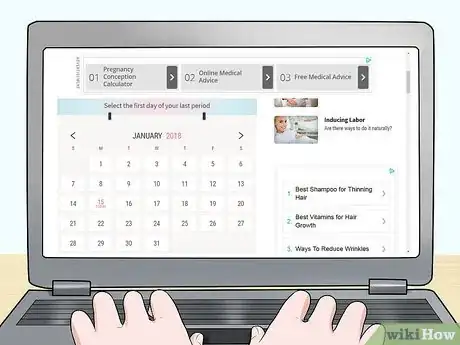
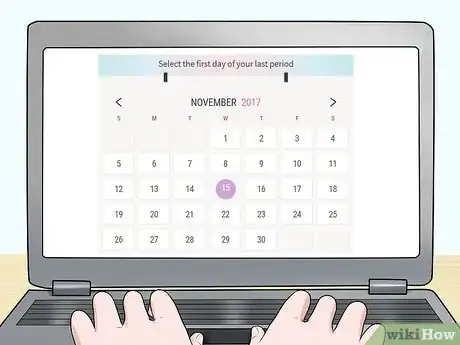


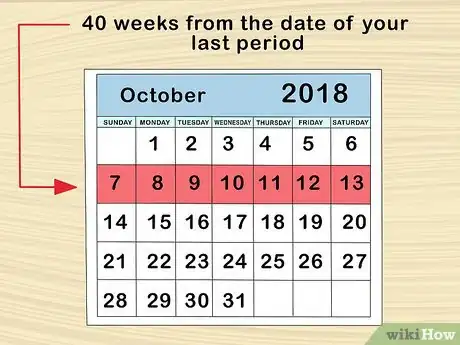
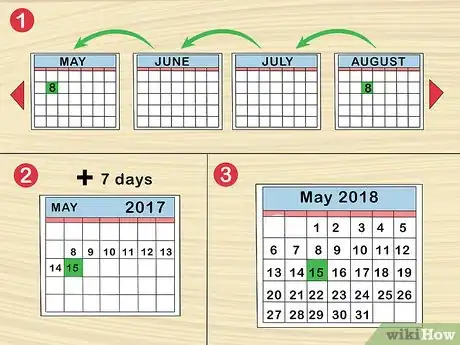


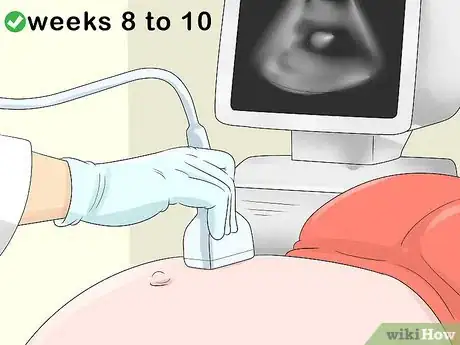

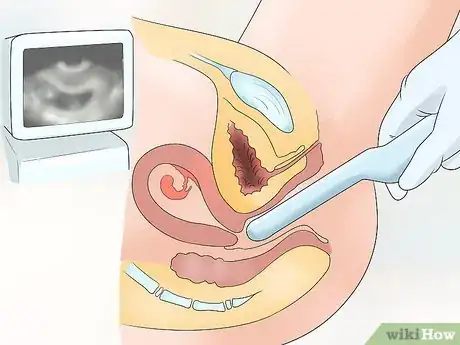































































Medical Disclaimer
The content of this article is not intended to be a substitute for professional medical advice, examination, diagnosis, or treatment. You should always contact your doctor or other qualified healthcare professional before starting, changing, or stopping any kind of health treatment.
Read More...